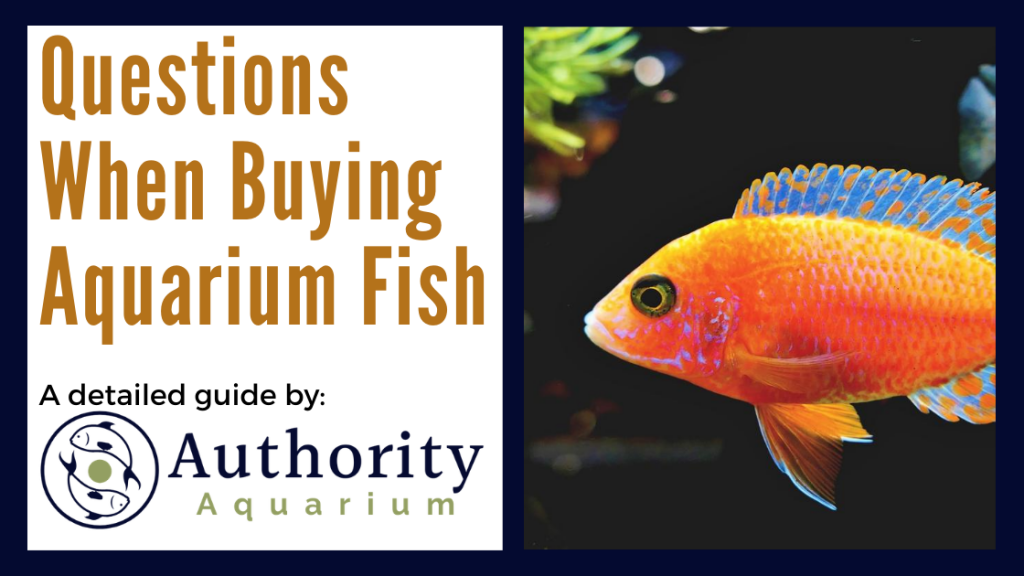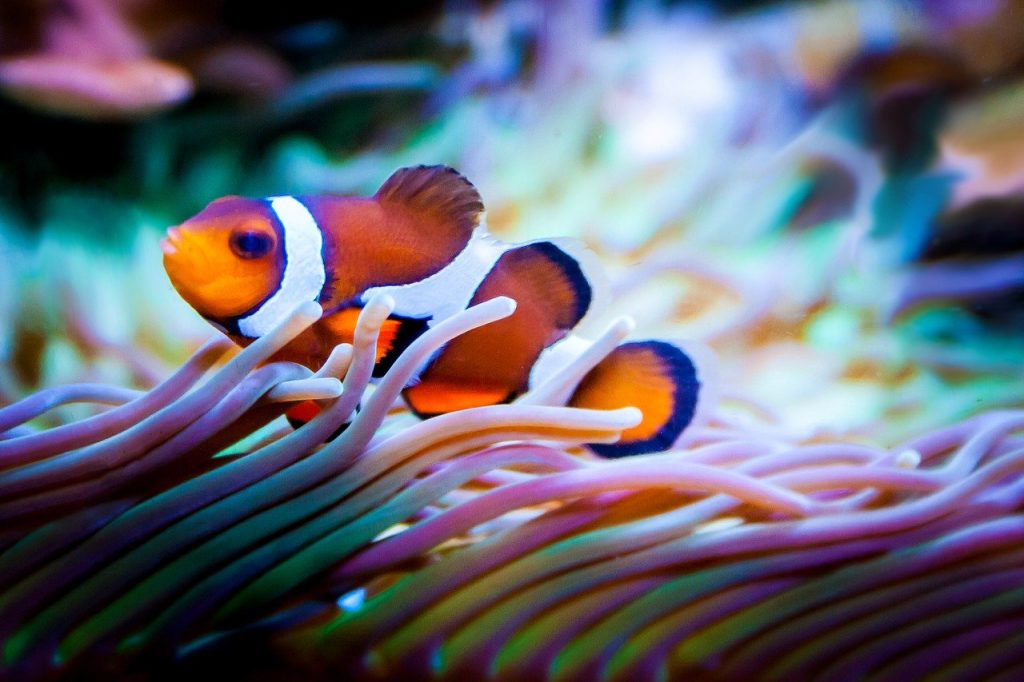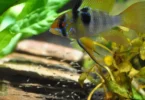Last Updated on April 24, 2023 by Coral Realm
If you’ve finally realized that your living room is missing a magnificent aquarium to complete the layout, you’ll be forgiven for jumping headlong into it and buying any old fish to put into your new fish tank.
But you need to reign in your excitement a little, not fully, but a little. There are important things you need to consider, and questions that you need to ask before buying your first aquarium fish.
An aquarium is a big commitment, and needs constant care and upkeep. But the rewards are huge. Whether you are looking to get saltwater fish for a reef tank, or freshwater fish for a stunning tropical tank, anyone will love having an aquarium in the home.
If you ask all these questions when buying aquarium fish then your new fish will thrive in your tank and will look healthy, amazing, and provide you with the perfect backdrop.
IN THIS ARTICLE
10 Important Questions When Buying Aquarium Fish

1. Are You At A Fully Registered Pet Store?
The whole idea of an aquarium is to bring a little bit of nature into your home. So it is important that you don’t damage the natural habitat to do so.
Always buy from a licensed seller as they have to maintain standards, and will know where each fish has originated from.
We always get captive-bred fish, not wild caught ones, as catching fish from the wild will damage that ecosystem.
2. What Species Of Fish Do You Want?
There are a multitude of fish species that you can buy for your aquarium, from freshwater to saltwater and from large to small. Check out our articles on the top saltwater fish for a nano aquarium and the best freshwater fish for some ideas!
They each will have their own intricacies that will make them unique, from there size, color, habitat requirements and diet.
Ensure you are fully aware of the species of fish you want or are buying, so you can ensure you can care for it properly.
3. What Type Of Aquarium Does This Fish Require?
Once you start looking at all the fish you can buy, it’s easy to just pick the prettiest one!
But each species will have it’s own needs and requirements.
For example is it a freshwater or saltwater fish? Does it require soft corals, or branching corals? Does it need a large or small aquarium? Does it need sand or large gravel as substrate? Many fish, especially smaller fish will need plants in the tank, as they will have plenty of places to hide amongst the leaves. Java Fern is a great option for freshwater tanks.
Getting the right fish for your tank is very important, otherwise the fish will become unhealthy.
4. What Sex Is The Fish?
The sex is important to know, as many male fish can be aggressive towards other males of the same species.
So if you are wanting a pair, they may need to be a mating pair, or two females.
However some species of fish are hermaphrodites, meaning they may change sex depending on the making of their group. Clownfish are like this. All are born as males, and when the female dies, one male will become the female.

5. What Behaviors Does It Show?
The behavior traits of the fish you want to take home are very important. For example will it be aggressive towards other fish in the aquarium?
In many fish males of the same species will often be aggressive towards each other, so they need to be kept alone, but they get along great with other fish species.
If you have corals or invertebrates in your tank, you should first know if the new fish will nibble at them or live happily with them.
Understanding the behaviors your fish will show means that you will be able to properly provide a great home for it.
6. What Age Is The Fish?
If you know the age of the fish you’re getting, you’ll be able to see if it has reached maturity. So you will know if it will get any larger, and if it will breed with other fish.
Also you might not want a five year old fish if the lifespan of the species is seven years!
As a little bonus, we always like to celebrate the birthdays of our fish. And they can also surprise you. Sometimes a fish that should only last a few years can survive for way longer! Knowing its age will maintain your interest in your aquarium.
7. What Is It’s Diet?
Knowing what food to feed your fish is vitally important. Some fish are carnivores, some are herbivores, and some are omnivores.
If you feed your fish the wrong diet they will get unhealthy and may die. They might also display behavioral changes. For instance they might get more aggressive towards other fish, or start to nip at crustaceans in the tank.
You should also be aware of when they should be fed. Many fish require feeding twice daily, whilst others may be different. Having floating aquarium plants in the tank may help to supplement their diet if they are herbivorous or omnivorous.
8. What Does The Fish Cost?
Many beginner aquarium fish are very reasonably priced. Beginner fish are generally very hardy and can withstand fluctuations in temperature, water chemistry and so on, which makes them easier to care for.
This also makes them cheaper, so for your first tank it’s recommended to get beginner fish. If you do have your eye on that amazingly unique breed, be prepared to pay a lot more for it.
Designer fish can be spectacularly impressive in a tank, but can be quite expensive. Be wary of someone offering a designer breed for a cheap price, as it may be unhealthy, or worse illegally obtained.
Many shops will do deals on shoaling fish, so ask!
9. Does It Have Any Unique Characteristics?
Knowing a bit about the characteristics of your fish, and whether it has any unique behaviors will enhance your interest in your aquarium.
Many fish species have extremely interesting natural histories, and knowing where they are originally from, what they would do in the wild, and any special traits will enable you to talk about your new fish and also build the best home possible for it.
Be a little wary as fish with extremely unique traits can be a bit on the pricey side.
10. How Do I Acclimate The Fish To My Aquarium?
This is an extremely important question to ask both yourself and the pet store when purchasing a new fish.
If you simply dump a fish into your tank it may go into shock and die.
You need to make sure your aquarium is the right temperature, salinity, chemical properties etc.
And if you have a new tank letting the water circulate through the canister filter or HOB filter for a week or two is important to let beneficial bacteria grow in the filter media.
So ensure you have all the essential accessories you need first, such as an aquarium filter, aquarium heater, aquarium thermometer, and any wave makers and powerheads you need before you put your fish in. And the fish may need time to get used to its new home.
Once you’ve satisfied all the conditions that the shop tell you, you are ready to buy your new pet.






